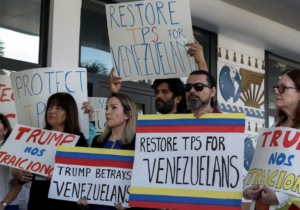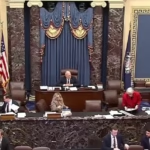The Trump administration’s decision to terminate Temporary Protected Status (TPS) for more than 240,000 Venezuelans, effective Friday November 7, marks a new stage in the dismantling of one of the United States’ primary humanitarian mechanisms, according to several immigrant rights organizations.
In a statement released Friday, the American Civil Liberties Union (ACLU) and other organizations explicitly urge Congress to pass legislation that provides a clear pathway for current and former TPS holders to obtain regularization and eventual citizenship. Their demand is for immediate, decisive congressional action to secure long-term protections.
Created by Congress in 1990, TPS protects foreign nationals from deportation when violence, natural disasters, or institutional collapse make their home country too dangerous for return. Its revocation for Venezuela “will leave hundreds of thousands of people vulnerable to detention and possible deportation to a country where many face persecution, arbitrary imprisonment, or serious harm,” the organizations warn. The consequences are also expected to be “immediate and destabilizing” in American communities where these families “have long contributed to local economies, schools, and neighborhood life.”
For the ACLU, the time has come for legislative mobilization
“This moment represents far more than the loss of status for a single group: it is a turning point in the Trump administration’s broader effort to attack TPS and other humanitarian protections, and to place hundreds of thousands of our neighbors at risk of deportation and arrest by masked agents,” says Haddy Gassama, senior policy counsel in the ACLU’s National Political Advocacy Department. “American voters have shown that they deeply reject the administration’s reckless deportation agenda; it is crucial that members of Congress show courage and unite behind legislation that protects TPS holders and offers a pathway to citizenship for millions of our neighbors and loved ones.”
Adelys Ferro, executive director of the Venezuelan American Caucus, draws attention to the impact on the Venezuelan diaspora. “At midnight, 260,000 Venezuelans will lose their TPS, joining the 340,000 who have already lost it. In total, more than 600,000 Venezuelans are having their legal protection removed, turning law-abiding, tax-paying families into individuals threatened with deportation. Many TPS holders are political refugees, victims of persecution, and active participants in their communities.”
A Broad Movement Targeting Multiple Nationalities
Beyond Venezuela, advocacy groups denounce a sweeping trend targeting several nationalities.
Since Donald Trump’s arrival at the White House, terminations have affected Afghanistan, Cameroon, Haiti, Honduras, Nepal, Nicaragua, Syria, and now Venezuela—exposing “more than 675,000 people” to family separation, detention, and forced removal. “The decision to end TPS for Venezuela and other eligible countries contradicts Congress’s original intent,” says Nils Kinuani, federal policy manager for African Communities Together. “Congress created this program precisely to protect vulnerable populations facing dangerous or unstable conditions.”
On the ground, community organizations fear a social upheaval. “Venezuelan migrants are now an integral part of our communities—they are our neighbors, colleagues, caregivers, and friends,” notes Dulce Guzman, executive director of Alianza Americas. “Yet this administration seems determined to dismantle every humanitarian and legal pathway for those seeking safety. Ongoing political repression, economic collapse, and human rights violations make a return to Venezuela dangerous, justifying the extension of TPS.”
The perceived discriminatory nature of current policy is also fueling anger.
“The termination of TPS for more than 240,000 Venezuelans is part of a deliberate strategy to dismantle protections for Black, Brown, and Middle Eastern communities,” argues Carolyn Tran, executive director of Communities United for Status & Protection (CUSP). “The same forces threatening Venezuelan families are also targeting Haitian, Sudanese, Ethiopian, Syrian, Burmese, Afghan, and Nepali families. Our strength lies in our collective resistance and our refusal to be divided. Congress must act now to protect all TPS holders and offer a pathway to citizenship.”
In households, the human impact is already visible, emphasizes CASA, a major service and advocacy organization. “Today, more than 240,000 Venezuelans join the growing community of TPS holders ‘de-legalized’ by this administration, exposed to the immediate risk of being separated from their families and deported without regard for their safety,” says George Escobar, director of programs and services. “TPS has allowed so many people to work and support their loved ones. The systemic dismantling of the program goes hand in hand with violent xenophobia, as Black and Brown members of our communities are targeted by law enforcement agents.”
The organizations stress that resolving this crisis requires Congress to immediately pass comprehensive legislation ensuring clear, permanent protections and durable status for TPS holders. They emphasize that, without prompt congressional action, the conclusion of TPS for Venezuelans initiates widespread legal and humanitarian instability, affecting not only those directly impacted but society at large.








